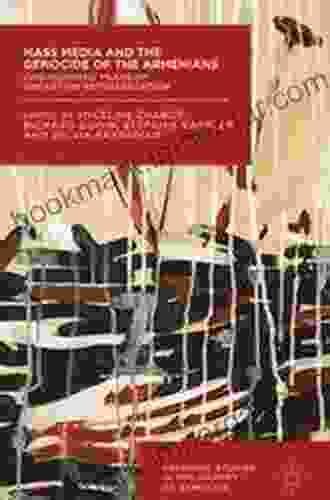One Hundred Years of Uncertain Representation: A Comprehensive History of a Contested Concept

Representation is a contested concept that has been debated for centuries. In this book, I provide a comprehensive history of the concept, exploring its evolution over the past century. Drawing on a wide range of sources, I examine the different ways in which representation has been understood and used in different contexts, from politics and law to art and literature.
4.5 out of 5
| Language | : | English |
| File size | : | 4215 KB |
| Text-to-Speech | : | Enabled |
| Screen Reader | : | Supported |
| Enhanced typesetting | : | Enabled |
| Print length | : | 260 pages |
I argue that representation is not a fixed or stable concept, but rather a contested and evolving one. The meaning of representation has changed over time, and it continues to be debated today. This book provides a comprehensive overview of the different ways in which representation has been understood and used, and it explores the implications of these different understandings for our understanding of democracy and justice.
Table of Contents
- Chapter 1: The Origins of Representation
- Chapter 2: Representation in the Enlightenment
- Chapter 3: Representation in the Romantic Era
- Chapter 4: Representation in the Victorian Era
- Chapter 5: Representation in the Modern Era
- Chapter 6: Representation in the Postmodern Era
Chapter 1: The Origins of Representation
The concept of representation has its origins in ancient Greece. The Greek word "representation" (mimesis) refers to the imitation or representation of reality. In ancient Greek drama, for example, actors represented the characters in the play. This concept of representation was later adopted by Roman thinkers, who used it to refer to the representation of the people by their elected officials.
In the Middle Ages, the concept of representation was further developed by Christian theologians. They argued that Christ represented the people of God, and that the Church represented Christ. This concept of representation was later used to justify the power of the Church and the monarchy.
Chapter 2: Representation in the Enlightenment
The Enlightenment was a period of great intellectual and social change. During this period, the concept of representation was re-examined and redefined. Enlightenment thinkers argued that the people were the source of all political power, and that they should be represented by their elected officials.
This concept of representation was reflected in the Declaration of Independence, which states that "all men are created equal" and that they have the right to "life, liberty, and the pursuit of happiness." The Declaration of Independence also established the principle of popular sovereignty, which means that the government derives its power from the consent of the governed.
Chapter 3: Representation in the Romantic Era
The Romantic Era was a period of great social and political upheaval. During this period, the concept of representation was again challenged and redefined. Romantic thinkers argued that the people were not simply a collection of individuals, but rather a community with a shared history and culture.
This concept of representation was reflected in the rise of nationalism, which emphasized the importance of the nation-state. Romantic thinkers also argued that the people should be represented by their cultural leaders, such as artists and writers.
Chapter 4: Representation in the Victorian Era
The Victorian Era was a period of great industrial and economic growth. During this period, the concept of representation was again re-examined and redefined. Victorian thinkers argued that the people should be represented by their economic interests.
This concept of representation was reflected in the rise of trade unions and other labor organizations. Victorian thinkers also argued that the people should be represented by their social class. This concept of representation was reflected in the rise of political parties.
Chapter 5: Representation in the Modern Era
The Modern Era was a period of great social and political change. During this period, the concept of representation was again challenged and redefined. Modern thinkers argued that the people should be represented by their race, gender, and sexual orientation.
This concept of representation was reflected in the rise of civil rights movements and other social justice movements. Modern thinkers also argued that the people should be represented by their global interests. This concept of representation was reflected in the rise of international organizations such as the United Nations.
Chapter 6: Representation in the Postmodern Era
The Postmodern Era is a period of great uncertainty and change. During this period, the concept of representation is again being challenged and redefined. Postmodern thinkers argue that there is no such thing as a single, objective reality. They also argue that there is no such thing as a single, true representation of reality.
This concept of representation is reflected in the rise of postmodern art and literature. Postmodern artists and writers often use multiple perspectives and fragmented narratives to represent the world. They also often challenge traditional notions of truth and reality.
The concept of representation is a contested and evolving one. The meaning of representation has changed over time, and it continues to be debated today. This book has provided a comprehensive overview of the different ways in which representation has been understood and used, and it has explored the implications of these different understandings for our understanding of democracy and justice.
As we move into the future, the concept of representation will continue to be challenged and redefined. It is important to remain open to new ways of thinking about representation, and to be willing to challenge traditional notions of truth and reality. Only by ng so can we ensure that representation remains a meaningful and relevant concept in our democracy.
4.5 out of 5
| Language | : | English |
| File size | : | 4215 KB |
| Text-to-Speech | : | Enabled |
| Screen Reader | : | Supported |
| Enhanced typesetting | : | Enabled |
| Print length | : | 260 pages |
Do you want to contribute by writing guest posts on this blog?
Please contact us and send us a resume of previous articles that you have written.
 Book
Book Novel
Novel Page
Page Chapter
Chapter Text
Text Story
Story Genre
Genre Reader
Reader Library
Library Paperback
Paperback E-book
E-book Magazine
Magazine Newspaper
Newspaper Paragraph
Paragraph Sentence
Sentence Bookmark
Bookmark Shelf
Shelf Glossary
Glossary Bibliography
Bibliography Foreword
Foreword Preface
Preface Synopsis
Synopsis Annotation
Annotation Footnote
Footnote Manuscript
Manuscript Scroll
Scroll Codex
Codex Tome
Tome Bestseller
Bestseller Classics
Classics Library card
Library card Narrative
Narrative Biography
Biography Autobiography
Autobiography Memoir
Memoir Reference
Reference Encyclopedia
Encyclopedia Josef Hoffmann
Josef Hoffmann Howard Mansfield
Howard Mansfield James Grehan
James Grehan Radwan Ziadeh
Radwan Ziadeh J A Rogers
J A Rogers Nigel Goodall
Nigel Goodall Theodore Draper
Theodore Draper Sylviane A Diouf
Sylviane A Diouf Jacob Darwin Hamblin
Jacob Darwin Hamblin J Matthew Gallman
J Matthew Gallman Pankaj Gupta
Pankaj Gupta Susan Baroncini Moe
Susan Baroncini Moe J Kent Layton
J Kent Layton Ruth Perednik
Ruth Perednik Patrick Kelley
Patrick Kelley Jack C Stanley
Jack C Stanley Hubert Chanson
Hubert Chanson Sally Babidge
Sally Babidge J Carl Laney
J Carl Laney Mark Leiren Young
Mark Leiren Young
Light bulbAdvertise smarter! Our strategic ad space ensures maximum exposure. Reserve your spot today!

 Adrien BlairFounding Fathers of America: A Journey into Patriotism, Vision, and the Birth...
Adrien BlairFounding Fathers of America: A Journey into Patriotism, Vision, and the Birth...
 W. Somerset Maugham"All Over But the Shouting": A Literary Masterpiece that Explores the Human...
W. Somerset Maugham"All Over But the Shouting": A Literary Masterpiece that Explores the Human... Bernard PowellFollow ·15.3k
Bernard PowellFollow ·15.3k Eugene PowellFollow ·11.5k
Eugene PowellFollow ·11.5k Andrew BellFollow ·5.7k
Andrew BellFollow ·5.7k Jayson PowellFollow ·12.2k
Jayson PowellFollow ·12.2k Christopher WoodsFollow ·19k
Christopher WoodsFollow ·19k Mike HayesFollow ·15.4k
Mike HayesFollow ·15.4k Harold PowellFollow ·7.7k
Harold PowellFollow ·7.7k Jared NelsonFollow ·12k
Jared NelsonFollow ·12k

 Mike Hayes
Mike HayesUnlock Your Nonprofit Potential: A Comprehensive Guide to...
: Embarking on the Path to Impactful...

 Cody Russell
Cody RussellUnlock the Secrets of Captivating Radio Programming:...
In the fiercely competitive world of...

 Aron Cox
Aron CoxUnveiling the Enchanting World of Beth Inspired Eye...
A Realm of Imagination and Wonder Embark on...

 Felix Carter
Felix CarterUnlock the Secrets of Legal Publishing with West Hartford...
West Hartford Legal Publishing, the renowned...

 Henry Hayes
Henry HayesUnveiling the Secrets of the Panama Papers: Exposing...
The Panama Papers is a groundbreaking...
4.5 out of 5
| Language | : | English |
| File size | : | 4215 KB |
| Text-to-Speech | : | Enabled |
| Screen Reader | : | Supported |
| Enhanced typesetting | : | Enabled |
| Print length | : | 260 pages |










